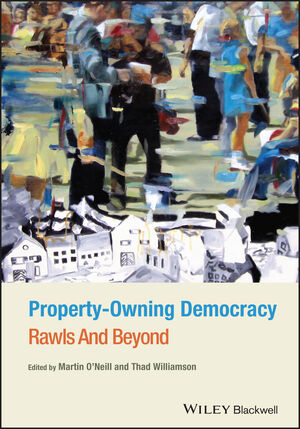Em uma passagem célebre de seu livro "Justiça como Equidade: Uma Reformulação", John Rawls afirmou que apenas dois sistemas socioeconômicos atenderiam as exigentes demandas igualitárias de dua teoria: um socialismo de mercado ou uma "property-owning democracy". As possibilidades por trás da "democracia de pequenos proprietários" (como ficou conhecida em português) é o objeto de análise do livro "Property-Owning Democracy: Rawls and Beyond" organizado por Thad Williamson e Martin O'neill. O livro reúne textos inéditos sobre o conceito e sobre as possibilidades efetivas de transformá-lo em realidade política.
- O livro foi resenhado por Paul Weithman na Notre Dame Philosophical Reviews:
[...]
In fact I believe that Rawls employs a methodology that is most accurately described as "mixed". The term "property-owning democracy" has a rich, varied and -- for progressives anyway, a checkered -- history that is amply documented in Jackson's essay. But like Meade, Rawls ignores that history and treats "property-owning democracy" as a term of art -- one for which he provides a stipulative description. That is, he simply stipulates that the term will denote a set of economic institutions, which he singles out because he believes they will realize aims given by justice as fairness. But a property-owning democracy is not just one of the social types that pursues the aims of justice as fairness. It is also a society that is well-ordered by justice as fairness. And so its aims are public knowledge because Rawls also stipulates that societies that are well-ordered satisfy the publicity condition. Property-owning democracy as Rawls understands it shares its aims with liberal socialism, but it differs from liberal socialism in allowing private ownership of a considerable amount of society's capital. As will be clear when we look at the institutions of property-owning democracy, there are no familiar cases of this regime-type the essentials of which Rawls's stipulative definition must capture if it is to be plausible. Rather, Meade and Rawls introduce property-owning democracy specifically to fill a previously uninhabited but, they think, fertile square in the logical space of political economy.
[...]
In fact I believe that Rawls employs a methodology that is most accurately described as "mixed". The term "property-owning democracy" has a rich, varied and -- for progressives anyway, a checkered -- history that is amply documented in Jackson's essay. But like Meade, Rawls ignores that history and treats "property-owning democracy" as a term of art -- one for which he provides a stipulative description. That is, he simply stipulates that the term will denote a set of economic institutions, which he singles out because he believes they will realize aims given by justice as fairness. But a property-owning democracy is not just one of the social types that pursues the aims of justice as fairness. It is also a society that is well-ordered by justice as fairness. And so its aims are public knowledge because Rawls also stipulates that societies that are well-ordered satisfy the publicity condition. Property-owning democracy as Rawls understands it shares its aims with liberal socialism, but it differs from liberal socialism in allowing private ownership of a considerable amount of society's capital. As will be clear when we look at the institutions of property-owning democracy, there are no familiar cases of this regime-type the essentials of which Rawls's stipulative definition must capture if it is to be plausible. Rather, Meade and Rawls introduce property-owning democracy specifically to fill a previously uninhabited but, they think, fertile square in the logical space of political economy.
- As propostas de reforma do Estado de Bem-Estar Social nos EUA já foi matéria no blog:
"Além do Estado de Bem-Estar: Rawls e os EUA"
"Além do Estado de Bem-Estar: Rawls e os EUA"

Table of Contents
Foreword xiii
Joshua Cohen and Joel Rogers
Joshua Cohen and Joel Rogers
Introduction 1
Martin O'Neill and Thad Williamson
Martin O'Neill and Thad Williamson
Part One: Property-Owning Democracy: Theoretical Foundations
1 Justice or Legitimacy, Barricades or Public Reason? The Politics of Property-Owning Democracy 17
Simone Chambers
Simone Chambers
2 Property-Owning Democracy: A Short History 33
Ben Jackson
Ben Jackson
3 Public Justification and the Right to Private Property: Welfare Rights as Compensation for Exclusion 53
Corey Brettschneider
Corey Brettschneider
4 Free (and Fair) Markets without Capitalism: Political Values, Principles of Justice, and Property-Owning Democracy 75
Martin O'Neill
Martin O'Neill
5 Property-Owning Democracy, Liberal Republicanism, and the Idea of an Egalitarian Ethos 101
Alan Thomas
Alan Thomas
6 Property-Owning Democracy and Republican Citizenship 129
Stuart White
Stuart White
Part Two: Interrogating Property-Owning Democracy: Work, Gender, Political Economy
7 Work, Ownership, and Productive Enfranchisement 149
Nien-he Hsieh
8 Care, Gender, and Property-Owning Democracy 163
Ingrid Robeyns
9 Nurturing the Sense of Justice: The Rawlsian Argument for Democratic Corporatism 180
Waheed Hussain
10 Property-Owning Democracy or Economic Democracy? 201
David Schweickart
David Schweickart
Part Three: Toward a Practical Politics of Property-Owning Democracy: Program and Politics 223
11 Realizing Property-Owning Democracy: A 20-Year Strategy to Create an Egalitarian Distribution of Assets in the United States 225
Thad Williamson
Thad Williamson
12 The Empirical and Policy Linkage between Primary Goods, Human Capital, and Financial Capital: What Every Political Theorist Needs to Know 249
Sonia Sodha
Sonia Sodha
13 The Pluralist Commonwealth and Property-Owning Democracy 266
Gar Alperovitz
Gar Alperovitz
14 Is Property-Owning Democracy a Politically Viable Aspiration? 287
Thad Williamson
Thad Williamson